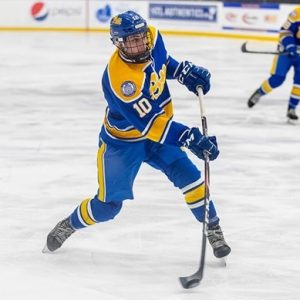 In the Wagner Cardiovascular Engineering Lab at the McGowan Institute, University of Pittsburgh student Benjamin Leslie studies congenital heart defect (CHD) valve malformations that can result in heart or valve infections, irregular heartbeats, blot clots, heart failure, and strokes.
In the Wagner Cardiovascular Engineering Lab at the McGowan Institute, University of Pittsburgh student Benjamin Leslie studies congenital heart defect (CHD) valve malformations that can result in heart or valve infections, irregular heartbeats, blot clots, heart failure, and strokes.
In between his time at the lab and juggling 18-credit semesters, Leslie is a forward on Pitt’s Division 1 men’s ice hockey team. In 2023, the team won the season’s Eastern States Collegiate Hockey League tournament and achieved its highest ranking in program history, coming in at No. 9. To date, Leslie’s hockey career spans more than 91 games.
In fact, it’s his love of ice hockey that’s spurred his passion in the lab. Leslie is especially interested in children experiencing the symptoms of CHD valve malformations. Each year, approximately 40,000 babies are born with CHD.
“For these kids, childhood often means a lot of time in the hospital undergoing major cardiac procedures,” Leslie said. “When I was a kid, I wanted to have fun and run around with my friends. To not to be able to enjoy any high-intensity activity or sport, let alone hockey, I can’t imagine how awful that must be.”
Current treatments include valve replacements, surgical procedures, and medications. However, each of these can have serious side effects.
At the Wagner Lab, Leslie has become intrigued by cellular engineering and studies valves made from the patient’s own tissues. The valves can grow as the patient does, reducing the number of surgeries the patient might need.
“Additionally, by being made from the patient’s own cells, the need for blood thinners would not be required,” said Leslie. “Therefore, children would be able to partake in sports like every other kid, without the risk of bleeding. This could give every kid a chance.”
Leslie’s drive is evident on and off the ice. On the ice, he’s known as a team captain, for his quick shot, and leading by example. Off the ice and in the lab, doctoral bioengineering student Drake Pedersen, who supervises Leslie, stated, “His eagerness to learn about the impact of our research was indicative of the type of student I appreciate training.”
The futures of both Leslie and tissue engineering look promising. And, while Leslie is still deciding on his plans as he enters his senior year at Pitt, Pedersen noted, “I’m not sure where Ben’s path will take him, but I feel he will excel wherever he goes.”
Read the full article from Pittwire here.
Image courtesy of Pitt Athletics
